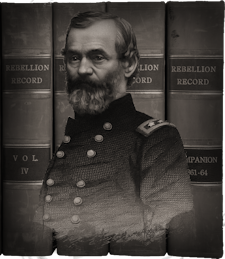February 7. — General Lander’s forces occupied Romney, Va., without a fight. The rebels retreated toward Winchester.—Cincinnati Gazette, February 8.
—At four o’clock this morning eleven companies of the Cameron Dragoons, Colonel Friedman, started from their camp near Washington, D. C, in the direction of Germantown, about a mile and a half from Fairfax Court-House, Va. It was the intention to make a thorough examination of the enemy’s picket lines outside the division boundaries. Owing to the early hour of starting, and secrecy and silence of the advance, they surprised a rebel picket detachment at a house near Germantown. Surrounding the house they took twelve prisoners, a capture effected, however, not without some show of resistance on the part of the enemy. Over a dozen shots were fired from the house at the Nationals. Captain Wilson was hit by one shot in the right ear, the ball passing through and making an ugly but not dangerous wound in the back of the neck. Sergeant Crumley was shot in the right leg, causing a painful but not serious flesh-wound. These were the only shots of the enemy that took effect.
While this firing was going on, a large company of mounted pickets, some of whom had escaped from the house, fled to a thicket near by and opened fire upon the National troops. Major Curry, placing his revolver at the head of one of the captured prisoners, called out to the men in the thicket if they fired another shot he would blow out the brains of every prisoner taken. This bold threat stopped the firing, and caused the rebels to plunge spurs into their horses and beat a rapid retreat across an open field.
Subsequently, upon looking into the vacant wood, the body of a dead rebel was found, which, in their retreating haste, they had left. One of the prisoners gave the name of the deceased as William Birbanks, and his residence as Barnwell Court House, N. C. He says that the deceased was a lawyer, and belonged to one of the wealthiest and most influential families in that place. This was the only rebel killed, so far as known. From traces of blood it was evident that several had been severely wounded. Besides the twelve prisoners, eight horses were taken.
The National cavalry proceeded to convey their prisoners and booty to the division headquarters. On the return the companies got separated. One squadron, under command of Captain O’Farrell, elated by their recent splendid performance, determined to make a dash towards Fairfax Courthouse on their own account. They had not advanced far before they had the satisfaction of taking four prisoners, one wagon and four horses. The men surrendered without opposition.—N. Y. Herald, February 8.
—A sword voted to Colonel Dixon H. Miles by the Legislature of the State of Maryland, was presented to him in the Hall of the House of Delegates, at Annapolis, in the presence of the members of both Houses and the Judges of the Court of Appeal. Speeches appropriate to the occasion were made by Governor Bradford and by Col. Miles.— Baltimore American, February 8.
—Harper’s Ferry, Va., was again the scene of stirring events resulting in the greater portion of it being reduced to ashes. A rebel flag of truce having approached the river, a boat was sent over to them, which was fired upon and one of the boatmen killed. Colonel Geary immediately ordered the shelling of the houses in which the rebel riflemen were concealed, including the Wager Hotel, all of which were subsequently burned. Another rebel flag afterwards approached the river, but Colonel Geary warned them off, refusing to receive it—(Doc. 29.)
—A resolution in favor of confiscating, liberating, and also arming the slaves of rebels, if it should become a military necessity, passed the State Senate of Maine to-day by a vote of twenty-four against four.
—The Lower House of Kansas, by a vote of sixty to seven, passed a resolution requesting President Lincoln to appoint General Lane a Major-General, and give him command of the Southern expedition.



